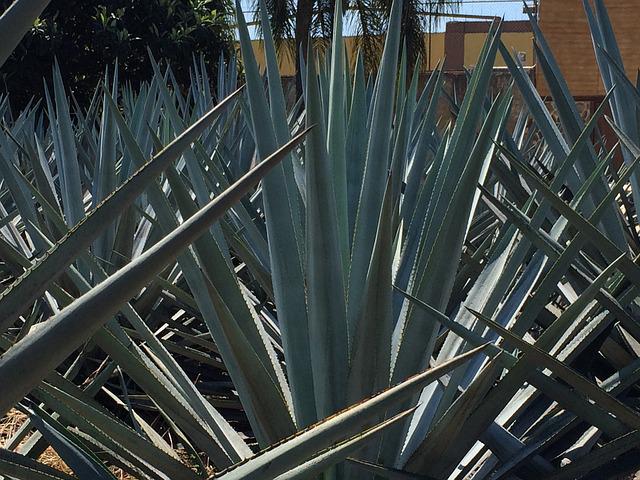Properties of agave inulin Tequilana weber blue variety
This type of agave has a high content of fructans of the inulin-type (FTI), which are a source of fermentable sugars; today they have been attributed functional properties that may have added economic and environmental value.

The high consumption of dietary fiber selectively stimulates the growth and/or metabolic activity of the microflora (prebiotic effect), which limits the number and incidence of pathophysiological disorders that can lead to certain diseases.
The agave Tequilana weber blue variety is one of the plants with the most dietary fiber; it is grown mainly in the states of Jalisco, Nayarit, Michoacán, Guanajuato, and Tamaulipas; it is used to prepare the beverage known as tequila. Mexico is considered the country of origin and has the greatest biological diversity of the agave genus, since of the 310 species reported, 272 are found in this country.
This type of agave has a high content of fructans of the inulin-type (FTI), which are a source of fermentable sugars in the process of making tequila, which was previously treated as a waste product; however, today they have been attributed to functional properties that may have added economic and environmental value due to the large production of agave heads.
Agave Tequilana Weber blue variety is the species with the highest content of FTI concerning other types since 97 percent of the carbohydrates present in four- to 6.5-year-old plants are fructans.
It is known that Mesoamericans have been consuming agave stems and leaf bases for almost 9,000 years. There is also archeological evidence found in the state of Chihuahua that shows an intensive consumption of approximately 135 grams per day of plants rich in inulin. Currently, an American consumes an average of 1 to 4 grams of inulin per day, a low intake compared to the typical diet in Europe, where an average of 3 to 11 grams of inulin per day is estimated.
The frequent consumption of FTI can be positive for health in a scheme of prevention and/or coadjuvant treatment during the development of various pathologies in different systems:
Bone health
It has been proven that agave FTIs increase the absorption of calcium and magnesium in plasma and bone. This can be attributed to the generation of short-chain fatty acids (SCFA), produced during fermentation, which lowers fecal pH and increases mineral solubility. In addition, it enhances cell growth and absorptive surface area in the small and large intestines. Other types of fructans have also been shown to counteract the chelating (trapping) action of phytic acid.
Gastrointestinal health
Through their prebiotic effect, FTIs can modulate the structure, activity, and composition of the mucosa and microorganisms of the gastrointestinal system, prevent the adhesion of pathogens by saturating bacterial adhesins and reduce constipation. It could also mitigate intestinal inflammation and systemically favor the immune response. Tequilana agave fructans increase the number of bifidobacteria and lactobacilli, the production of SCFA, intestinal movements, and soften bowel movements.
Energetic metabolism
According to research, the FTI extracted from this plant can increase the intestinal secretion of anorexigenic peptides and incretins; therefore, they reduce postprandial glucose, increase insulin sensitivity, stimulate weight loss, and decrease energy intake and the hepatic and serum concentration of triglycerides and cholesterol. They also can reduce inflammatory and oxidative markers.
Cancer
Microflora is responsible for the degradation of mutagenic products; it also influences inflammation and immunity and competes against bacteria that possess pro-carcinogenic enzymes. Likewise, evidence has been found that prebiotics counteracts the adverse effects of radiotherapy and chemotherapy since these treatments reduce the population of beneficial intestinal bacteria.
Conclusion
In 1992, it was declared that prebiotic inulin is generally recognized as a safe compound (GRAS); however, side effects such as osmotic diarrhea, abdominal noise, inflammation, cramps, and excessive flatulence have been observed with the consumption of agave FTI. Given this, it is suggested to divide its consumption into small doses throughout the day up to 20 grams total, or to add a single dose of up to 10 grams per day.
There is little evidence describing the FTI of agave Tequilana weber blue variety on health, however, it is considered that its effect may be more dynamic compared to products extracted from other sources. Some effects could be attributed to it, since positive results have been found when combined with other prebiotics, such as a decrease in blood pressure, atherosclerotic plaque, and symptomatology and severity of hepatic encephalopathy. Although there are still unresolved questions, agave inulin promises to be an important bioactive element or food additive.
Source: Universitarios Potosinos, Author: Talia Franco Avila. She has a degree in Nutrition from the University Center of Health Sciences of the Universidad de Guadalajara (UDG). She works in the Department of Microbiology and Pathology of the University Center of Health Sciences of the UDG.




